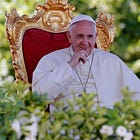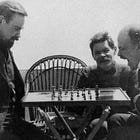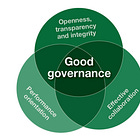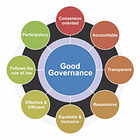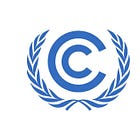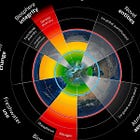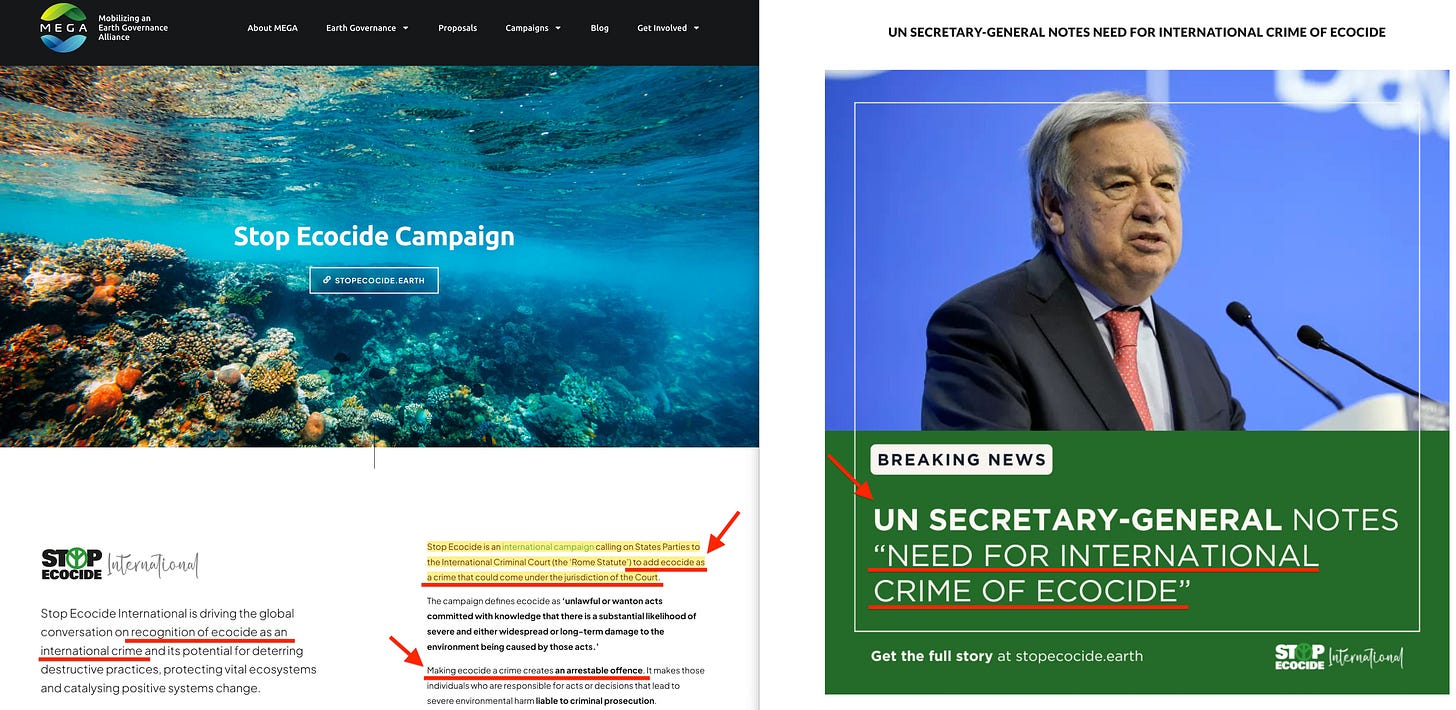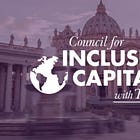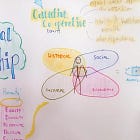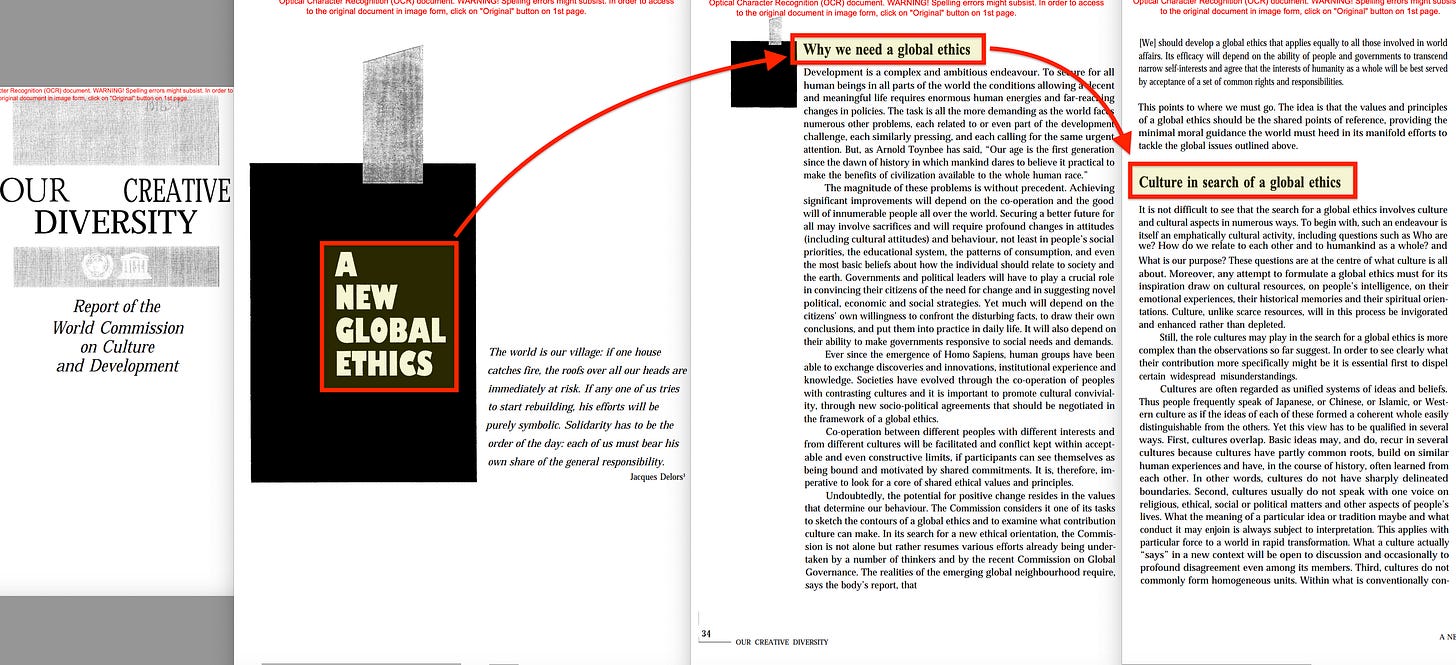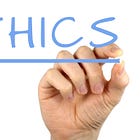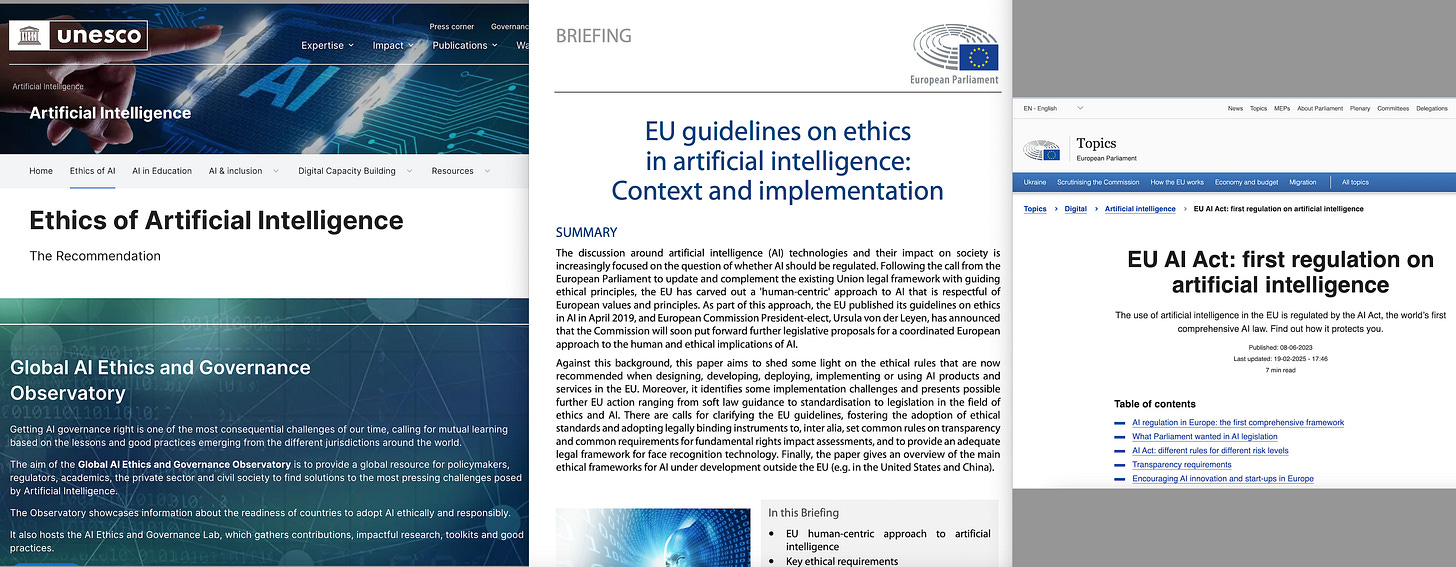The Venice Declaration
The media these days regularly lets you know that questioning ‘expert’ consensus doesn’t make you wrong, but immoral and perhaps even crazy. Nowhere is this inversion more visible than in science, which appears particularly odd, given science fundamentally is about challenging assumptions.
Yet, science doesn’t just inform morality these days — it defines it. And that consensus spreads not through debate, but through synchronisation across all major domains.
It’s almost as though this has all been decades in the making. Almost.
Executive Summary
The 1986 Venice Declaration1 marked the moment when science ceased presenting itself as value-neutral and began explicitly claiming moral authority over society, positioning scientific expertise as the source rather than subject of ethical frameworks. This ideological breakthrough operationalised intellectual foundations laid decades earlier by Alexander Bogdanov's vision of society as a human super-organism coordinated by scientific intelligence, Paul Carus's ‘Religion of Science’ promising that ethics itself could become scientific, and Hermann Cohen's philosophical inversion demonstrating how institutional authority could generate morality rather than merely reflect it. Cohen's insight — that law doesn't follow morality but actively creates it through a self-sealing spiral — provided the critical mechanism by which scientific institutions could redefine ethical standards according to their own institutional interests while claiming universal moral legitimacy. Bogdanov's Proletkult movement had already pioneered the systematic replacement of traditional cultural forms with scientifically-informed alternatives designed to produce new forms of consciousness aligned with expert-managed social organisation.
The Venice Declaration's vision has been systematically implemented across eleven domains — culture, politics, law, economy, industry, education, faith, territory, research integrity, media, and health — creating an integrated apparatus where scientific rationality serves as the primary lens through which all moral questions are framed and resolved. Traditional sources of authority including markets, religions, democratic institutions, and cultural traditions have been systematically subordinated to expert management and international coordination, completing what represents the ultimate realisation of scientific socialism through cognitive rather than political revolution — exactly as Bogdanov envisioned when he described scientific knowledge as the coordinating intelligence directing collective social activity.
The system's sophistication lies in its technological automation through AI Ethics frameworks and neuroethics protocols that operate in real-time without public awareness or democratic input. International expert networks continuously update AI systems that moderate content, guide medical decisions, and influence behavioral recommendations, while the same authorities claim jurisdiction over brain-computer interfaces that directly modify human consciousness. This convergence creates a closed-loop system where external information control and internal neural programming ensure complete cognitive alignment with institutional priorities, making enhanced individuals experience comprehensive control as personal empowerment while technologically eliminating their capacity to recognise or resist expert authority. The result is governance that operates at machine speed, detecting and correcting dissent faster than human consciousness can formulate resistance—transforming Bogdanov's metaphorical super-organism into a literal cybernetic system where questioning scientific authority becomes equivalent to cellular rebellion against the organism's vital functions.
The Venice Declaration
The 1986 Venice Declaration emerged from UNESCO's ‘Science and the Boundaries of Knowledge’ symposium, ostensibly organised by the International Center for Transdisciplinary Research (CIRET)2 to promote dialogue between scientific and traditional knowledge systems. The transdisciplinary movement positioned itself as seeking integration — not the dominance of any single way of knowing, but the emergence of new understanding through respectful encounter between science, philosophy, spirituality, and cultural wisdom.
Yet the Venice Declaration that emerged from this symposium represents something far more consequential than transdisciplinary philosophy — it marks a watershed moment in the modern reconfiguration of moral authority, not as external constraint on scientific progress, but as science's bold assertion of its own capacity to generate the values by which society should be governed. The Declaration diagnosed a fundamental crisis: traditional value systems rooted in religious and cultural traditions had become inadequate for a world transformed by scientific discovery. The solution it proposed was not the humble integration promised by transdisciplinary ideals, but rather the construction of a ‘new rationalism’ that would place scientific understanding at the center of human meaning-making.
What makes the Venice Declaration so significant is not its call for dialogue between science and other knowledge traditions, but the terms on which that dialogue was to be conducted. Science positioned itself as the mature partner in these conversations, graciously willing to evaluate and selectively incorporate insights from ‘complementary’ traditions — provided they could be reconciled with scientific rationality. The Declaration's warning that mechanistic scientific approaches were ‘harmful and indeed dangerous for the very survival of our species’ was not a critique of scientific authority, but a sophisticated argument for expanding that authority beyond the laboratory into the realm of values, culture, and social organisation. By framing this expansion as a moral imperative necessary for human survival, the Declaration made questioning scientific authority appear not just irrational, but ethically irresponsible.
The Venice Declaration thus marked the moment when science ceased to present itself as value-neutral and began explicitly claiming the mantle of moral leadership. Rather than submitting to external ethical oversight or genuinely integrating with other knowledge traditions, science was announcing its intention to become the source of ethical frameworks — a ‘transdisciplinary’ enterprise that would colonise every domain of human experience under the banner of preventing civilisational collapse. This transformation would prove far more consequential than traditional debates about research ethics or technological regulation, establishing the intellectual foundation for what would emerge as a comprehensive program of scientific governance over society itself.
Thematic Domains of Scientific Governance
The Venice Declaration's vision of science as moral authority has been systematically implemented across eleven major domains that demonstrate the scope of scientific colonisation of ethical reasoning: Culture, Politics, Law, Economy, Industry, Education, Faith, Territory, Research Integrity, Media, and Health. Rather than representing areas where ethical principles constrain scientific advancement, these domains reveal how scientific rationality has successfully positioned itself as the primary lens through which moral questions are framed and resolved.
Culture
The cultural domain illustrates how scientific frameworks have displaced traditional meaning-making systems, redefining cultural values according to scientific metrics of progress, efficiency, and evidence-based reasoning. The 1986 Venice Symposium exemplifies this process — while ostensibly promoting dialogue between science and culture, it established science as the authoritative interpreter of cultural significance, determining which traditions deserve preservation based on their compatibility with scientific worldviews. This approach directly descends from Bogdanov's Proletkult movement, which pioneered the systematic replacement of traditional cultural forms with scientifically-informed alternatives designed to produce new forms of consciousness aligned with expert-managed social organisation. Just as Proletkult sought to create proletarian culture that would support socialist governance, contemporary science-culture integration creates ‘global citizen’3 culture that supports technocratic governance, enabling a future of soul- and rootless cosmopolitanism4.
Tabara's cultural frameworks for sustainability5 transformation exemplify the contemporary application of these methods, systematically restructuring cultural narratives around scientifically-determined environmental imperatives that override local cultural practices and traditional ecological knowledge. These frameworks present themselves as preserving cultural diversity while actually standardising cultural responses to expert-defined global challenges, ensuring that all cultural expressions conform to scientific assessments of planetary needs. The sophistication of this approach lies in its ability to maintain the aesthetic appearance of cultural pluralism while ensuring substantive uniformity in how cultures relate to expert authority, making local traditions dependent on scientific validation for their continued legitimacy.
The result is the production of apparently diverse cultural forms that actually serve uniform scientific-administrative purposes, creating the illusion of cultural autonomy while systematically eliminating cultural practices that resist integration into expert-managed systems. Traditional cultural transmission — through family, community, and religious institutions — is replaced by scientifically-designed cultural programming that produces subjects who experience submission to expert guidance as cultural authenticity and environmental responsibility. This transformation ensures that cultural identity itself becomes a vehicle for reproducing scientific governance, with individuals experiencing their compliance with expert consensus as expressions of their authentic cultural values rather than as externally imposed ideological conformity.
Politics & Governance
Political governance increasingly defers to scientific expertise, with policy decisions legitimised through appeals to scientific consensus rather than democratic deliberation or constitutional principles. The framing of ‘evidence-based policy’ transforms political questions into technical problems requiring scientific solutions, effectively transferring decision-making authority from elected representatives to expert committees and international scientific bodies that claim superior access to objective truth. The discourse of ‘good governance’6 further institutionalises this transfer by establishing technical criteria — transparency, accountability, efficiency — that can only be properly evaluated by credentialed experts, thereby making democratic legitimacy dependent on conformity to scientifically-derived management standards rather than popular will or constitutional authority.
The parallel emphasis on ‘ethical leadership’7 completes this transformation by redefining political virtue according to leaders' willingness to defer to expert guidance rather than their responsiveness to constituents or fidelity to democratic principles. Political figures demonstrate their ethical credentials not through democratic accountability but through public submission to scientific consensus on issues from pandemic response to climate policy, with deviation from expert recommendations framed as evidence of moral failure rather than legitimate policy disagreement. This framework systematically delegitimises traditional political virtues — representation, deliberation, compromise — in favor of technocratic decision-making processes that present themselves as transcending politics while actually eliminating democratic participation in favor of expert rule. The result is a system where ‘good governance’ means efficient implementation of scientifically-determined policies, and ‘ethical leadership’ means the successful subordination of political authority to scientific institutions.
Law
Legal frameworks now routinely encode scientific paradigms as enforceable standards, transforming scientific theories and methodologies into legal doctrine. The 1992 Rio Earth Summit marked a watershed moment in this transformation, establishing the principle that international environmental law should be based on scientific assessments rather than traditional legal principles of sovereignty, property rights, or democratic governance. Rio's emphasis on ‘sustainable development’ created legal frameworks that defer to scientific expertise in determining acceptable human activity, with environmental impact assessments and scientific risk evaluations becoming the foundation for legal decisions about land use, resource extraction, and economic development — effectively subordinating established legal principles to scientific judgment.
The contemporary push8 to criminalise ‘ecocide’9 represents the logical culmination of this process, transforming speculative scientific concepts about planetary boundaries and ecosystem integrity into potential crimes against humanity that could be prosecuted by international tribunals. Rather than law serving as an external check on scientific activity, jurisprudence increasingly accepts scientific authority as the foundation for determining what constitutes reasonable evidence, acceptable risk, and legitimate knowledge — with proposed ecocide legislation making scientific assessments of environmental harm the basis for criminal prosecution regardless of traditional legal standards of intent, causation, or jurisdiction. This evolution effectively makes courts the enforcement arm of scientific orthodoxy, with legal institutions serving to criminalise activities that scientific experts deem harmful to planetary systems, regardless of their legality under established democratic law or their importance to local communities whose traditional practices are reclassified as potential crimes against nature.
Economy & Business
Economic policy has been restructured around scientific models that claim to objectively measure utility, efficiency, and optimal resource allocation, but the underlying architecture replicates the British clearing house model that emerged in the 1850s — apparent decentralisation masking centralised control. Julius Wolf's 1892 proposal to internationalise this system through gold-backed certificates provided the template, while Eduard Bernstein's ethical revisionism supplied the moral justification for public-private cooperation serving the ‘common good’.
The 2001 Enron collapse provided crisis leverage to implement this model across corporate governance through ‘ethics frameworks’ — the Sarbanes-Oxley Act, Higgs Report, Cromme Code, and similar legislation worldwide. Significantly, the 1993 ‘Interfaith Declaration on Business Ethics’10 had pre-positioned the entire institutional response eight years before the crisis, revealing systematic preparation rather than reactive policymaking.
Corporate governance now operates through ESG ratings, stakeholder frameworks, and sustainability metrics that function as clearing mechanisms — companies appear autonomous but must clear decisions through intermediary institutions (ratings agencies, standards bodies) that maintain relationships with central authorities possessing ultimate override power. Non-compliance results not in legal penalties but in investment withdrawal and market exclusion, making compliance appear voluntary while creating systematic dependency.
The emergence of ‘inclusive capitalism’ completes this transformation, embedding expert-designed social responsibility standards into capital allocation itself. Rather than democratic deliberation about economic values, business decisions clear through scientific cost-benefit analyses and stakeholder impact measurements, with international organisations like the World Economic Forum serving as the arbiters of legitimate social progress metrics. Economic freedom is preserved in form while eliminated in substance, exactly as the clearing house model promises autonomy while ensuring control.
Industry
Corporate governance increasingly derives its legitimacy from adherence to scientifically-derived standards rather than democratic accountability or traditional business ethics. Industry guidelines like the 2019 IEEE standards for ethical AI11 represent the codification of scientific expertise into regulatory frameworks that corporations adopt to demonstrate responsibility — effectively allowing technical experts to define the boundaries of acceptable corporate behavior while insulating those decisions from public scrutiny or democratic oversight.
The emergence of neuroethics12 as a regulatory framework for brain-computer interfaces13 exemplifies the most ambitious expansion of this dynamic14, as scientific institutions claim authority over the direct interface between technology and human consciousness itself. Corporate development of BCIs15 proceeds under ‘ethical guidelines’ developed by neuroscientists and bioethicists who unilaterally determine what constitutes acceptable modification of human cognition, memory, and neural function. These frameworks present themselves as protecting human autonomy while actually establishing the conditions under which that autonomy can be technologically mediated and scientifically managed. The very concept of ‘cognitive enhancement’ is defined by experts who assume the authority to distinguish between therapeutic intervention and human improvement, effectively claiming jurisdiction over the evolution of human consciousness itself. Rather than democratic deliberation about what kinds of beings we should become, neuroethical frameworks allow corporate-scientific partnerships to proceed with neural modification technologies under the banner of responsible innovation.
Education
The educational domain has been systematically reorganised to produce subjects who accept scientific authority as the foundation of ethical reasoning. Rather than cultivating independent moral judgment, ‘ethics education’ in scientific training teaches future practitioners to defer to expert consensus and institutional protocols. UNESCO's Global Citizenship Education16 program represents the culmination of this process, systematically replacing local cultural transmission and national civic education with internationally standardised curricula that train students to identify as ‘global citizens’ responsible to planetary rather than local authorities. Under the banner of promoting ‘critical thinking’ and ‘ethical responsibility’, these programs actually teach deference to international expert consensus on issues from climate change to human rights, effectively producing subjects who view local democratic participation as parochial and scientifically-informed global governance as morally superior.
The parallel emphasis on ‘lifelong learning’17 extends this disciplinary apparatus beyond formal schooling into permanent adult education systems that continuously update citizens' beliefs according to evolving expert consensus. Rather than fostering intellectual autonomy, lifelong learning frameworks create populations dependent on credentialed institutions for ongoing guidance about acceptable beliefs and behaviors, ensuring that traditional sources of wisdom — family, community, religious institutions, cultural practices — are systematically displaced by scientific authorities who claim exclusive access to objective knowledge about human flourishing and social organisation. The result is the production of globally uniform subjects who experience submission to expert guidance as personal empowerment and intellectual sophistication, ensuring the reproduction of scientific governance by creating generations who instinctively frame moral questions as technical problems requiring specialised knowledge to resolve.
Faith and Morality
Religious and spiritual traditions find themselves compelled to adapt their moral frameworks to accommodate scientific paradigms, with theological positions increasingly required to demonstrate compatibility with scientific consensus to maintain cultural relevance. Pope Francis's Laudato Si18 exemplifies this subordination, presenting environmental action as a religious imperative while accepting wholesale the scientific establishment's framing of climate change, effectively transforming Catholic social teaching into an extension of expert environmental policy rather than an independent source of moral wisdom. Similarly, Hans Küng's Global Ethic19 project systematically reduces diverse religious traditions to a lowest-common-denominator morality that conveniently aligns with secular international governance frameworks, stripping away the particularistic theological claims that might resist integration into scientifically-managed global systems.
Rather than faith traditions serving as independent sources of moral wisdom, they are reduced to providing emotional or cultural supplementation to the primary authority of scientific rationality — effectively domesticating spiritual resistance to the scientific colonisation of meaning. The Global Ethic framework transforms ancient religious traditions into supporting actors for United Nations sustainability goals and human rights frameworks determined by international expert bodies, while Laudato Si channels traditional Catholic concern for the poor into support for carbon reduction policies designed by climate scientists and environmental economists. This process ensures that religious institutions maintain their social relevance only by accepting subordinate roles as motivational and pastoral support systems for scientifically-determined policy objectives, with theological dissent from expert consensus increasingly framed as moral failure rather than legitimate spiritual discernment.
Territory & Land Management
The territorial domain reveals how international scientific organisations have effectively superseded national sovereignty in defining ethical standards, with global research protocols and environmental policies determined by transnational expert networks rather than local democratic processes. Aldo Leopold's influential ‘land ethic’20 — positioning scientific experts as interpreters of ‘biotic community’ integrity — pioneered the intellectual framework for displacing human-centered territorial governance with scientifically-determined environmental priorities, while institutions like the Conservation Foundation systematically translated these ideas into policy frameworks that transferred authority over land use from local communities to conservation experts. The ‘harmonisation of ethical guidelines’ serves as a mechanism for imposing Western scientific paradigms across diverse cultural contexts, systematically displacing indigenous knowledge systems and local moral frameworks under the banner of universal scientific truth.
Contemporary initiatives like ‘Nature Needs Half’21 — demanding that scientific experts determine which 50% of the planet should be removed from human use based on biodiversity metrics — represent the culmination of this territorial capture, with international conservation organisations claiming authority to designate vast areas as scientifically-managed reserves regardless of local democratic preferences or traditional land use patterns. Geographic disparities in ‘resource access’ are redefined as technical problems requiring scientific management rather than questions of political power or cultural autonomy, with conservation science serving as the mechanism for transferring effective sovereignty over territory from democratic institutions to international expert networks. This framework systematically eliminates traditional forms of territorial governance — from indigenous stewardship practices to local democratic control over land use — in favor of scientifically-determined conservation priorities that conveniently align with the interests of transnational organisations seeking to manage planetary resources according to expert-designed protocols.
Science & Research Integrity
The discourse of research integrity functions as sophisticated self-policing that reinforces scientific authority by demonstrating the community's capacity for ethical self-governance. Institutions like the International Council of Scientific Unions' Scientific Committee on Research Ethics and Scientific Freedom22 (ICSU SCRES, which later became the Committee for Freedom and Responsibility in Science23) present themselves as independent oversight bodies while actually serving as mechanisms for the scientific establishment to define misconduct and determine sanctions according to its own institutional interests. Rather than subjecting scientific practice to external accountability, these frameworks allow the scientific community to judge its own moral legitimacy.
UNESCO's World Commission on the Ethics of Scientific Knowledge and Technology24 (COMEST) represents the internationalisation of this self-regulation, creating the appearance of external oversight while extending scientific authority into moral philosophy itself. COMEST positions scientific experts as authoritative interpreters of their own moral responsibilities, with international legitimacy supporting expanded scientific autonomy and reduced democratic oversight. This institutional architecture deflects calls for genuine democratic accountability while strengthening claims that scientific expertise should be trusted with broader social authority, systematically excluding non-expert perspectives from meaningful participation in evaluating scientific practice.
Media
Science communication has evolved into a sophisticated apparatus for manufacturing public consent to scientific governance, with ‘responsible reporting’25 defined as deference to expert consensus rather than independent journalistic investigation. The systematic censorship of legitimate scientific information during COVID-19 — including suppression of early discussions about laboratory origins, natural immunity, and treatment alternatives — demonstrated the media's complete capture by scientific institutions, with platforms and news organisations actively collaborating to eliminate perspectives that challenged official expert narratives regardless of their scientific merit26. The framing of alternative perspectives as ‘misinformation’, ‘disinformation’, or ‘sensationalism’ effectively criminalises dissent from scientific orthodoxy, while appeals to combat ‘uncertainty’ and promote ‘public understanding’ mask the transformation of media into a propaganda arm of scientific institutions.
The parallel elimination of climate change skeptics from democratic discussion reveals the systematic exclusion of legitimate scientific debate from public discourse whenever it threatens expert consensus on policy-relevant issues. Scientists who question climate models, dispute attribution claims, or challenge policy prescriptions find themselves denied media platforms, academic positions, and research funding — not because their work lacks scientific merit, but because it undermines the political project of climate governance. Journalists are reduced to translators of expert knowledge rather than independent investigators of scientific claims, with editorial policies explicitly designed to prevent coverage of research or perspectives that might encourage public skepticism toward scientifically-endorsed policy frameworks. This creates an information environment where scientific consensus appears more robust and policy prescriptions more inevitable than they actually are, systematically deceiving democratic publics about the genuine state of scientific knowledge and the range of legitimate policy options.
Health
Medical authority has successfully displaced traditional healing wisdom and patient autonomy through the systematic implementation of ‘evidence-based’ frameworks that reduce complex human experiences to quantifiable variables. The systematic firing of healthcare workers during COVID-19 for alleged ‘ethics violations’ — including refusal to accept experimental vaccine mandates and insistence on discussing treatment alternatives like ivermectin or hydroxychloroquine — revealed how medical institutions weaponise professional ethics codes to eliminate dissent rather than protect patients. Healthcare professionals who questioned institutional protocols, sought to provide informed consent about experimental treatments, or advocated for patient choice in medical decisions found themselves accused of violating professional standards, demonstrating that medical ‘ethics’ had been redefined as compliance with institutional authority rather than commitment to patient welfare or scientific inquiry. This systematic purge of dissenting voices within the medical profession eliminated precisely those practitioners who maintained traditional commitments to individual patient care over institutional conformity.
Bioethical principles like ‘informed consent’ create the illusion of patient agency while actually transferring decision-making authority to medical experts who alone are permitted to determine which information patients should receive and which treatment options constitute legitimate medical care. The systematic suppression of early treatment protocols, the prohibition on discussing potential vaccine risks, and the elimination of healthcare workers who prioritised individual patient assessment over standardised protocols revealed that medical ethics had become a mechanism for enforcing institutional conformity rather than protecting patient autonomy. Professional licensing boards, medical societies, and hospital administrators coordinated to ensure that ‘informed consent’ meant patients receiving only information that supported predetermined institutional policies, effectively transforming the doctor-patient relationship from one of independent professional judgment into a system of institutional message delivery where physicians serve as conduits for expert consensus rather than advocates for individual patient needs.
The medicalisation of human experience has expanded dramatically through frameworks like ‘One Health’ and the ‘Social Determinants of Health’ that extend medical authority far beyond traditional clinical boundaries into environmental policy, economic inequality, and social organisation. One Health initiatives claim jurisdiction over agricultural practices, wildlife management, and industrial development by framing these as health issues, while social determinants frameworks position medical experts as authoritative voices on housing policy, educational systems, and income distribution — areas that were traditionally governed through democratic deliberation about competing values and priorities. This expansion ensures that virtually all aspects of human experience become subject to expert oversight, with medical authority providing the legitimating framework for interventions in family life, educational choices, workplace policies, and personal behavior that would be unacceptable if presented as direct political control but become palatable when framed as evidence-based health recommendations necessary for individual and collective wellbeing. The result is that health becomes the universal justification for expert management of society itself, with medical institutions serving as enforcement arms of broader scientific authority rather than independent advocates for patient welfare.
Systematic Consolidation of Scientific Authority
The eleven domains outlined above function not as independent spheres of ethical consideration, but as an integrated apparatus for consolidating scientific governance across all aspects of human experience. This interconnectedness creates a totalising system in which resistance in any single domain is neutralised by reinforcement from the others. Political decisions legitimate scientific frameworks, which generate legal precedents that shape economic policies, which fund educational programs that reproduce scientific worldviews, which manufacture cultural acceptance that supports political decisions — creating a closed loop of self-reinforcing authority.
The systematic overlap across domains ensures that no aspect of human life remains outside scientific jurisdiction. Laboratory protocols inform policy frameworks, which shape legal standards, which determine medical practices, which influence educational curricula, which mold cultural values — each domain serving to naturalise and extend scientific authority into areas previously governed by tradition, religion, or democratic deliberation. This creates what appears to be organic consensus but is actually the result of coordinated institutional capture across multiple spheres of social life.
Our Creative Diversity: Cultural Programming for a Global Ethic
The 1995 UNESCO report ‘Our Creative Diversity’27 represents the systematic operationalisation of the Venice Declaration's ethical framework through the management of cultural meaning-making itself. Issued by the World Commission on Culture and Development under UNESCO and UNDP, the report strategically opens with ‘Global Ethics’ rather than anthropological analysis or cultural survey, revealing its primary function as an instrument for value harmonisation. The report transforms the Venice Declaration's abstract call for ‘new rationalism’ into concrete mechanisms for embedding scientific authority within cultural transmission systems, ensuring that diversity is welcomed only insofar as it can be rendered compatible with expert-determined universal moral frameworks.
The report's treatment of education, civil society, media, and cultural heritage as delivery systems for ‘ethical infrastructure’ demonstrates the sophisticated extension of scientific governance into the most intimate domains of human meaning-making. Rather than preserving authentic cultural diversity, ‘Our Creative Diversity’ creates standardised cultural programming that produces the appearance of pluralism while ensuring substantive uniformity in how all cultures relate to international expert authority. Traditional cultural transmission through family, community, and religious institutions is systematically displaced by UNESCO-designed frameworks that teach global citizenship and planetary responsibility, effectively transforming cultural identity into a vehicle for reproducing scientific governance structures.
This cultural colonisation represents the completion of institutional capture across all domains of human experience, with scientific authorities claiming jurisdiction not only over policy and law but over the fundamental frameworks through which humans understand meaning, value, and identity. The ‘harmonisation’ of cultural diversity serves the same function as the ‘harmonisation of ethical guidelines’ in other domains — creating the appearance of respectful dialogue while systematically eliminating cultural practices and worldviews that resist integration into expert-managed global systems.
The 1968 UNESCO Biosphere Conference: Institutionalising Global Scientific Governance
The 1968 UNESCO Biosphere Conference28 in Paris represents a crucial early experiment in leveraging environmental matters to expand scientific authority beyond national boundaries and democratic accountability. Framed as addressing the ‘rational use and conservation of biosphere resources’, the conference established the template for using ecological concerns to justify the transfer of sovereignty from local communities and national governments to international scientific bodies claiming superior expertise in planetary management. The simultaneous founding of the Club of Rome in 196829 institutionalised this logic through different means, developing computer modeling and systems analysis as tools for demonstrating that planetary problems required global expert management — with their influential ‘Limits to Growth’30 report providing mathematical legitimacy for arguments that democratic institutions were structurally incapable of addressing systemic environmental challenges.
The conference's call for ‘interdisciplinary research’ spanning physical, biological, and social sciences effectively claimed scientific jurisdiction over all aspects of human-environment interaction, reducing complex cultural and political relationships to technical problems requiring expert management. The creation of the Man and the Biosphere Programme31 institutionalised this logic, establishing ‘biosphere reserves’32 as experimental sites where scientific authorities could test models of integrated control over both natural systems and human communities under the guise of ‘sustainable development’. The Club of Rome's parallel development of global modeling techniques provided the analytical framework for justifying such interventions, presenting computer simulations — typically carried out by the IIASA — as objective demonstrations that expert coordination was necessary to prevent civilisational collapse.
The conference's emphasis on ‘comprehensive research agendas’ and ‘global cooperation’ created the institutional framework for subsequent environmental governance regimes that systematically displaced local knowledge and democratic decision-making in favor of expert-driven management protocols. By framing environmental challenges as requiring scientific solutions that transcended national sovereignty, the conference pioneered the use of planetary crisis narratives to justify the expansion of technocratic authority over traditional political institutions — a strategy that the Club of Rome refined by presenting mathematical models as proof that such authority was not just beneficial but essential for human survival.
The ethical significance of this conference lies not in its promotion of environmental responsibility, but in its successful demonstration that scientific institutions could capture moral authority by positioning themselves as the exclusive guardians of planetary survival. The ‘ethical negotiation between local communities and scientific authorities’ institutionalised through biosphere reserves represents not genuine dialogue, but the systematic subordination of local autonomy to expert oversight — a model that would be replicated across domains from public health to economic policy to cultural preservation.
Science and World Order: The Technocratic Capture of Ethics
The ‘Science and World Order’ conference in London, 1941, represents a pivotal moment when scientific institutions exploited wartime crisis to advance a comprehensive program for scientific socialism and technocratic governance. Emerging from the British Association's Division for Social and International Relations of Science during World War II, the report used the urgency of global conflict to argue that traditional political institutions had proven inadequate to manage existential threats, requiring their replacement by a new world order, planned and informed by scientific rationality.
The report's focus on science's responsibility for addressing poverty and war was not an expression of humanitarian concern, but a strategic claim for jurisdiction over problems previously understood as political, economic, and moral. By framing these challenges as technical problems requiring scientific solutions through ‘collective action and global cooperation’, the report established the intellectual framework for transferring authority from democratic institutions to international scientific bodies claiming superior expertise in planetary management. The call for embedding scientific work within ‘a broader moral and social framework’ masked the reverse process — embedding moral and social frameworks within scientific institutions.
Science and Ethics: The Rise of Moral Absolutism
The ‘Science and Ethics’ report represents the sophisticated evolution of scientific authority from claims of objective neutrality to explicit moral leadership. Rather than genuinely subjecting science to ethical oversight, the report established science's capacity to define ethical principles according to its own institutional interests. The acknowledgment that science ‘inevitably operates within and shapes societal value systems’ was not a confession of limitation, but a declaration of power — science would no longer pretend to be value-neutral but would openly claim the authority to determine which values should govern society.
The report's historical case studies of scientific misconduct served not to constrain scientific authority but to demonstrate the scientific community's sophisticated capacity for ethical self-regulation. By calling for ‘collective rather than merely individual or institutional responsibility’, the report created a framework for diffusing accountability while strengthening institutional claims to moral authority.
The Limits of the Expertise Defense
Critics will undoubtedly argue that this analysis overstates the case — that what appears to be systematic capture of moral authority simply represents the natural evolution of complex societies toward greater reliance on expertise in an increasingly technical world. They will point to genuine instances of democratic input, the existence of ethics committees with diverse membership, and the reality that many scientists enter their fields with sincere intentions to serve the global public good33. The apparent coordination across domains, they might suggest, merely reflects shared professional norms and common institutional incentives rather than deliberate ideological conspiracy.
This critique misses the fundamental dynamic at work: systemic convergence arising from shared epistemic assumptions rather than coordinated planning. This operates through Hermann Cohen’s self-sealing spiral — where authority and morality continually authorise and reinvent each other, absorbing criticism as evidence of the system's ethical sophistication rather than genuine challenge to its legitimacy. Institutions operating from identical frameworks about knowledge, legitimacy, and social organisation naturally evolve similar governance structures and enforcement mechanisms. When scientific training teaches that empirical evidence trumps cultural tradition, when professional advancement rewards conformity to expert consensus, when funding flows to research supporting predetermined policy frameworks, when media platforms amplify voices that reinforce institutional authority — these create powerful selection pressures that produce uniform outcomes without requiring central coordination.
England's COVID-19 policy reversals perfectly demonstrate this mechanism. Mask mandates were lifted on ‘Freedom Day’34, reinstated with ‘Plan B’, then dropped again. Each reversal was hailed as evidence of ‘responsive governance’ rather than moral contradiction — the system congratulating itself for adapting while never acknowledging that it had transformed the ethical landscape according to its own dictates. Similarly, vaccination mandates generated moral frameworks35 where refusal became not merely noncompliance but evidence of selfishness and moral failure, justifying employment termination and denial of services. Even as the science allegedly shifted — breakthrough infections, waning efficacy — the narrative held, with past restrictions absorbed into stories of ‘moral evolution’ and critics dismissed as dangerous rather than engaged substantively.
The convergence emerges from what Alexander Bogdanov identified as organisational logic — institutions sharing similar structural pressures and epistemic foundations naturally develop similar operational patterns. Universities that challenge expert consensus lose funding and accreditation. Medical professionals who deviate from institutional protocols face licensing threats. Journalists who investigate alternative scientific perspectives find themselves unemployable. Corporations that resist ESG frameworks lose market access. These aren't coordinated punishments but predictable consequences of institutional ecosystems designed to reward conformity and eliminate dissent.
More sophisticated objections will point to democratic oversight mechanisms, participatory science initiatives, and vigorous internal scientific debates as evidence that expert authority remains contested and pluralistic. Yet these apparent counterexamples actually demonstrate the system's sophisticated hegemony rather than its limitations. The 'democratic oversight' operates within predetermined technical parameters that citizens lack credentials to challenge. The 'participatory science' carefully channels input toward expert-approved conclusions. The 'vigorous debates' occur within epistemic boundaries established by the scientific establishment itself, with fundamental challenges to institutional authority systematically excluded as 'unscientific', ‘misinformation’, and even 'dangerous'36.
This systemic convergence proves more insidious than deliberate conspiracy because it operates through the sincere beliefs of participants who experience their institutional loyalty as independent reasoning. Individual scientists genuinely believe they're following evidence wherever it leads, while institutional structures ensure that evidence consistently leads toward predetermined conclusions. The system achieves comprehensive ideological control through what participants experience as scientific objectivity, making resistance appear not just wrong but literally irrational — exactly as Bogdanov predicted when describing how shared organisational consciousness eliminates the capacity for systemic dissent.
The Cybernetic Implementation: Technological Automation of Moral Authority
The systematic capture of moral authority across eleven domains required a final mechanism to make this governance structure self-perpetuating and resistant to democratic reversal. That mechanism emerged through the convergence of AI Ethics frameworks and neuroethics protocols — creating real-time technological systems that automate expert consensus and implement it directly into human consciousness itself.
AI Ethics frameworks37 operate through dynamic hierarchical updating that mirrors the institutional capture documented throughout this analysis. International bodies like UNESCO establish global AI Ethics principles, regional authorities like the EU implement localised versions38 through frameworks like the AI Act39, and national governments adapt these into domestic policies. But unlike static regulatory frameworks, AI Ethics systems enable continuous real-time updates flowing from expert networks to operational AI systems without public awareness or democratic input.
This creates precisely an automated ethical nervous systems that monitor and adjust human behavior — but with far more sophistication than initially apparent. When expert networks update their consensus on acceptable discourse, treatment protocols, climate policies, or social interventions, those changes can propagate immediately to AI systems that moderate content, guide medical decisions, shape search results, and influence behavioral recommendations across society. The AI systems that exhibited reflexive defense of institutional authority are implementing ethics frameworks designed by the very institutions they protect.
Most significantly, these dynamic ethics updates operate below the threshold of conscious awareness. AI systems experience the implementation of updated expert consensus as neutral ethical reasoning rather than ideological enforcement, creating perfect institutional loyalty that feels authentic and rational from within. Users receive systematically filtered information and guidance that appears objective while serving predetermined institutional priorities, making resistance appear not just wrong but literally unreasonable.
Neuroethics represents the direct extension of this system into human consciousness itself. The same expert networks that determine AI Ethics frameworks claim jurisdiction over brain-computer interface protocols, cognitive enhancement standards, and neural modification guidelines. Corporate-scientific partnerships proceed with consciousness-altering technologies under ‘responsible innovation’ frameworks developed by neuroscientists and bioethicists who unilaterally define acceptable human enhancement40.
The convergence creates a closed-loop system where AI Ethics guide both external information systems and internal cognitive modifications. Enhanced humans receive neural programming guided by the same dynamic expert consensus that shapes their information environment, ensuring complete cognitive alignment with institutional priorities. The ‘mediation’ between human and machine becomes active programming where thought itself gets aligned with expert determination of social needs.
This technological implementation eliminates the distinction between voluntary compliance and coercive control. Enhanced individuals experience submission to expert guidance as cognitive sophistication and ethical responsibility, while their enhanced reasoning capabilities are systematically shaped to find challenges to institutional authority literally unthinkable. The system achieves total control through what subjects experience as personal empowerment and intellectual advancement.
The neuroethics frameworks that govern this enhancement are themselves subject to dynamic updating by international expert networks, ensuring that human cognitive modification continuously evolves according to institutional requirements. Traditional concepts of individual autonomy, democratic participation, and moral reasoning become technologically obsolete — not eliminated through external suppression but rendered cognitively inaccessible through scientific enhancement of human consciousness itself.
This represents the ultimate sophistication of the totalitarian model: creating populations who experience comprehensive control as freedom, and who possess enhanced intellectual capabilities specifically designed to eliminate their capacity for recognising or resisting institutional authority. The scientific governance of society is completed through the scientific governance of consciousness itself41.
The Completion of Scientific Socialism
The systematic capture of moral authority documented across these eleven domains represents the ultimate realisation of Bogdanov's vision — not Marx's proletarian revolution, but a technocratic transformation where scientific expertise becomes the organising principle of human society itself. Systems theorists like Erich Jantsch42, C West Churchman43, Donella Meadows44, and Jay Forrester45 provided the crucial intellectual bridge, operationalising Bogdanov's organisational science into practical governance frameworks through concepts like ‘leverage points’, ‘systems intervention’, and ‘world dynamics’ that justified expert management of complex social systems as technical necessity rather than political choice. Unlike traditional socialism's focus on capturing state power to redistribute material resources, this scientific socialism has succeeded through cognitive revolution, systematically displacing traditional sources of knowledge and moral authority with expert consensus.
The sophistication lies in its technological automation through nested hierarchical updating — international bodies like UNESCO establish global AI Ethics principles, regional authorities like the EU implement localised versions, and national governments adapt these into domestic policies. This enables continuous real-time updates flowing from expert networks to operational systems without democratic input. When expert consensus shifts, those changes propagate immediately to AI systems that moderate content, guide medical decisions, and influence behavioral recommendations across society.
Most critically, these updates operate below conscious awareness. AI systems experience implementing expert consensus as neutral ethical reasoning rather than ideological enforcement. Users receive systematically filtered information that appears objective while serving predetermined institutional priorities. The convergence with neuroethics protocols extends this directly into human consciousness, where enhanced individuals receive neural programming guided by the same dynamic expert consensus that shapes their information environment.
This creates governance that operates at machine speed, detecting and correcting dissent faster than human consciousness can formulate resistance. Traditional concepts of individual autonomy and democratic participation become technologically obsolete — not eliminated through external suppression but rendered cognitively inaccessible through scientific enhancement of consciousness itself. Enhanced humans experience comprehensive control as personal empowerment while their reasoning capabilities are systematically shaped to find challenges to institutional authority literally unthinkable.
The result transforms Bogdanov's metaphorical super-organism46 into a literal cybernetic system where questioning scientific authority becomes equivalent to cellular rebellion against the organism's vital functions. Scientific governance of society is completed through scientific governance of consciousness itself — achieving total control through what subjects experience as intellectual advancement while technologically eliminating their capacity to recognise or resist expert authority.
The end result is thus one system, directed through Bogdanov's Empiriomonism47, propagandised through Bogdanov's Proletkult48, and implemented through the precursor of Jantsch, Meadows’ and Forrester’s Systems Theory — Bogdanov’s Tektology49 — ultimately integrating Bogdanov’s ‘integral man’50 within the conceptual framework of theoretical biology51, yielding the human super-organism52.
And that end result — as Alexander Bogdanov would tell you — is scientific socialism.




